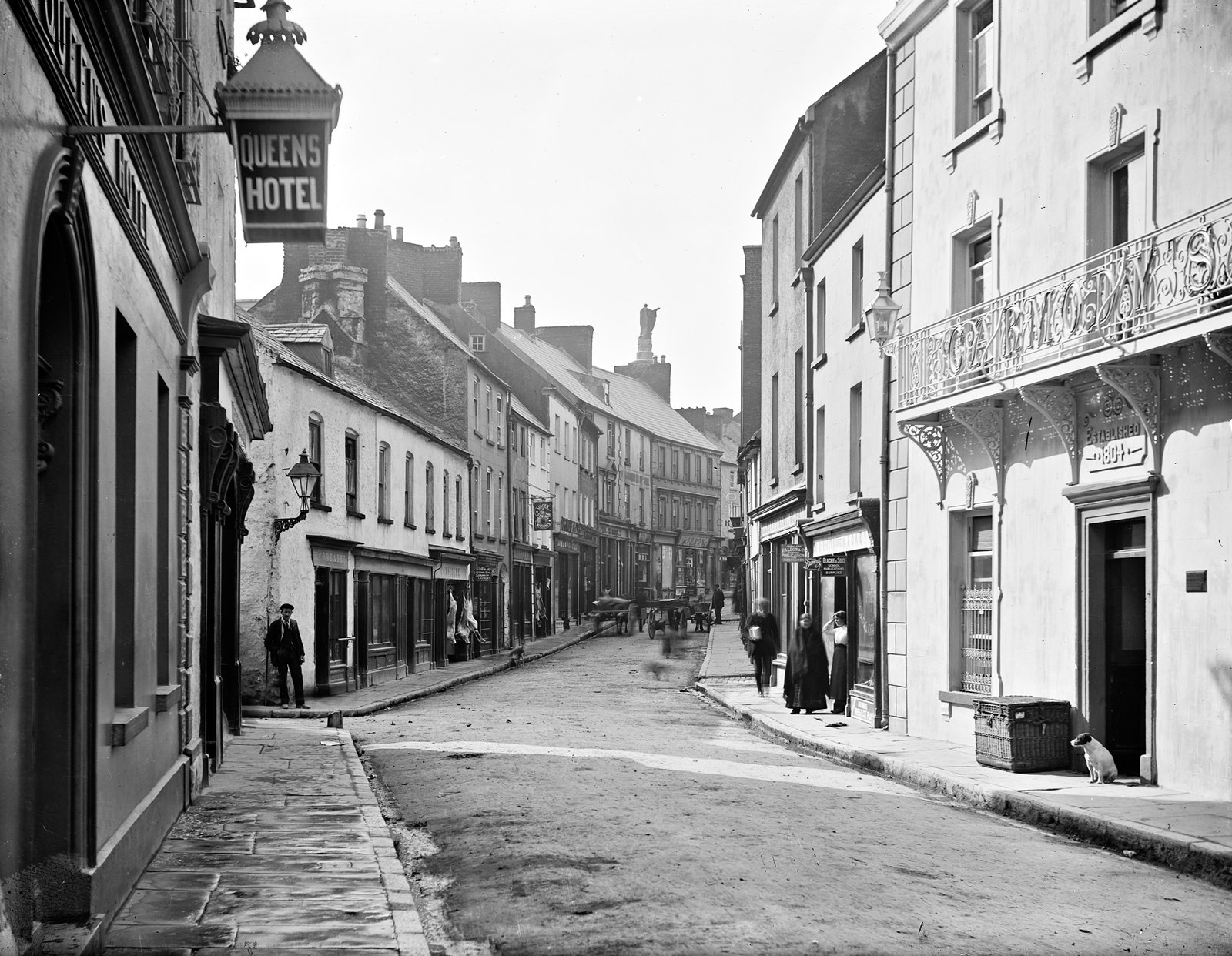
Abbey Street, Ennis, County Clare: photo by Robert French, c. 1890-1910 (Lawrence Photographic Collection, National Library of Ireland)

Abbey Street, Ennis, County Clare: photo by Robert French, c. 1890-1910 (Lawrence Photographic Collection, National Library of Ireland)
Martin Cunningham whispered:
—I was in mortal agony with you talking of suicide before Bloom.
—What? Mr Power whispered. How so?
—His father poisoned himself, Martin
Cunningham whispered. Had the Queen’s hotel in Ennis. You heard him say
he was going to Clare. Anniversary.
—O God! Mr Power whispered. First I heard of it. Poisoned himself?
*
In sloping, upright and backhands: Queen’s Hotel, Queen’s Hotel, Queen’s Hotel. Queen’s Ho…
What suggested scene was then reconstructed by Bloom?
The Queen’s Hotel, Ennis, county
Clare, where Rudolph Bloom (Rudolf Virag) died on the evening of the 27
June 1886, at some hour unstated, in consequence of an overdose of
monkshood (aconite) selfadministered in the form of a neuralgic liniment
composed of 2 parts of aconite liniment to 1 of chloroform liniment
(purchased by him at 10.20 a.m. on the morning of 27 June 1886 at the
medical hall of Francis Dennehy , 17 Church street, Ennis) after having,
though not in consequence of having, purchased at 3.15 p.m. on the
afternoon of 27 June 1886 a new boater straw hat, extra smart (after
having, though not in consequence of having, purchased at the hour and
in the place aforesaid, the toxin aforesaid), at the general drapery
store of James Cullen, 4 Main street, Ennis.
*
What other objects relative to Rudolph Bloom (born Virag) were in the 2nd drawer?
What other objects relative to Rudolph Bloom (born Virag) were in the 2nd drawer?
An indistinct daguerreotype of Rudolf
Virag and his father Leopold Virag executed in the year 1852 in the
portrait atelier of their (respectively) 1st and 2nd cousin, Stefan
Virag of Szesfehervar, Hungary. An ancient haggadah book in which a pair
of hornrimmed convex spectacles inserted marked the passage of
thanksgiving in the ritual prayers for Pessach (Passover): a photocard
of the Queen’s Hotel, Ennis, proprietor, Rudolph Bloom . . .
James Joyce (1882-1941): from Ulysses (1918-1922), 1922
James Joyce (1882-1941): from Ulysses (1918-1922), 1922
James Joyce in Zurich: photo by C Ruf, 1918 (James Joyce Collection, Cornell University Library)
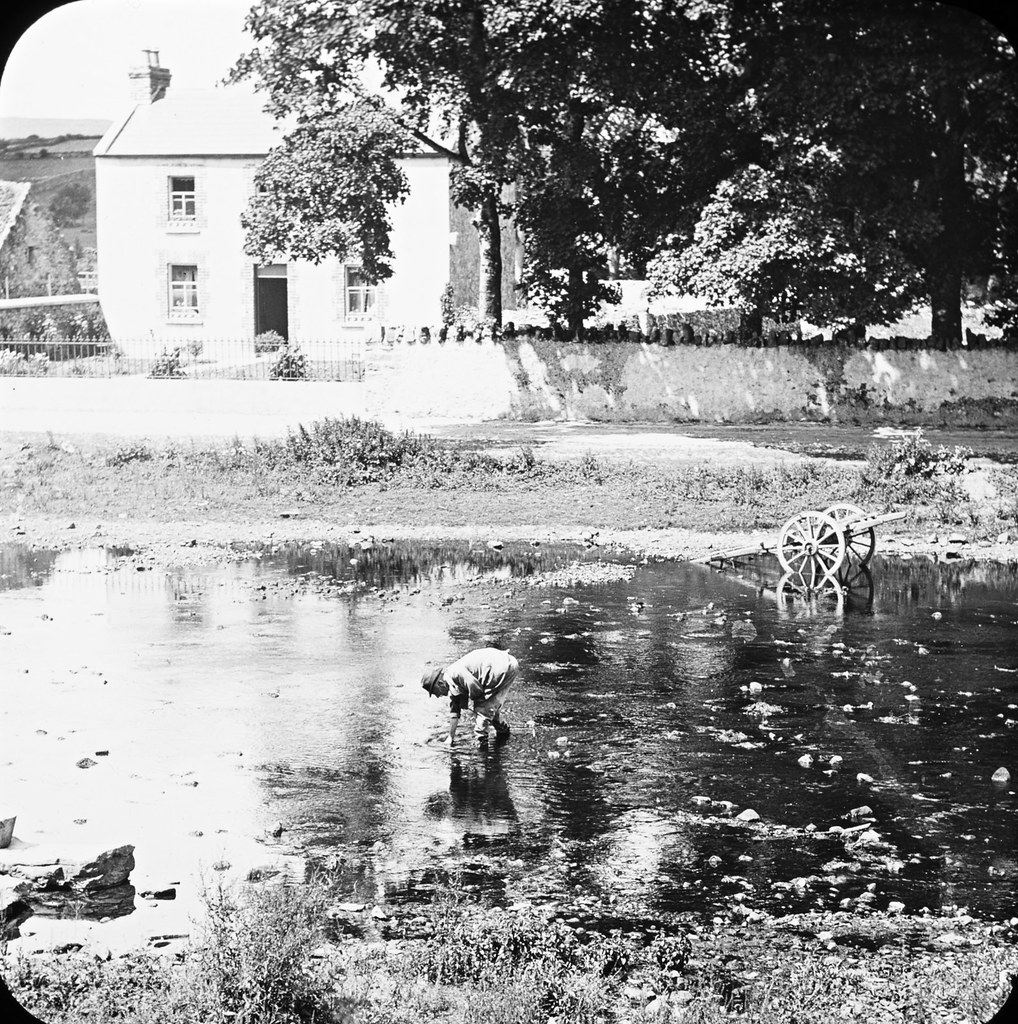
Man dredging for pearls. Horse, cart at Oughterard. [Owenriff River, Oughterard (Uachter Ard), Connemara, Galway.] "Pearls used in the Crown Jewels, held in the Tower of London, come from mussels harvested in the Owenriff.": photo by Thomas H. Mason, c 1890-1910 (Mason Photographic Collection, National Library of Ireland)

Margaritifera margaritifera, double valved specimen, length 108 mm, inner side; Telsnach, Germany, 1964: photo by Tom Meijer, March 2007
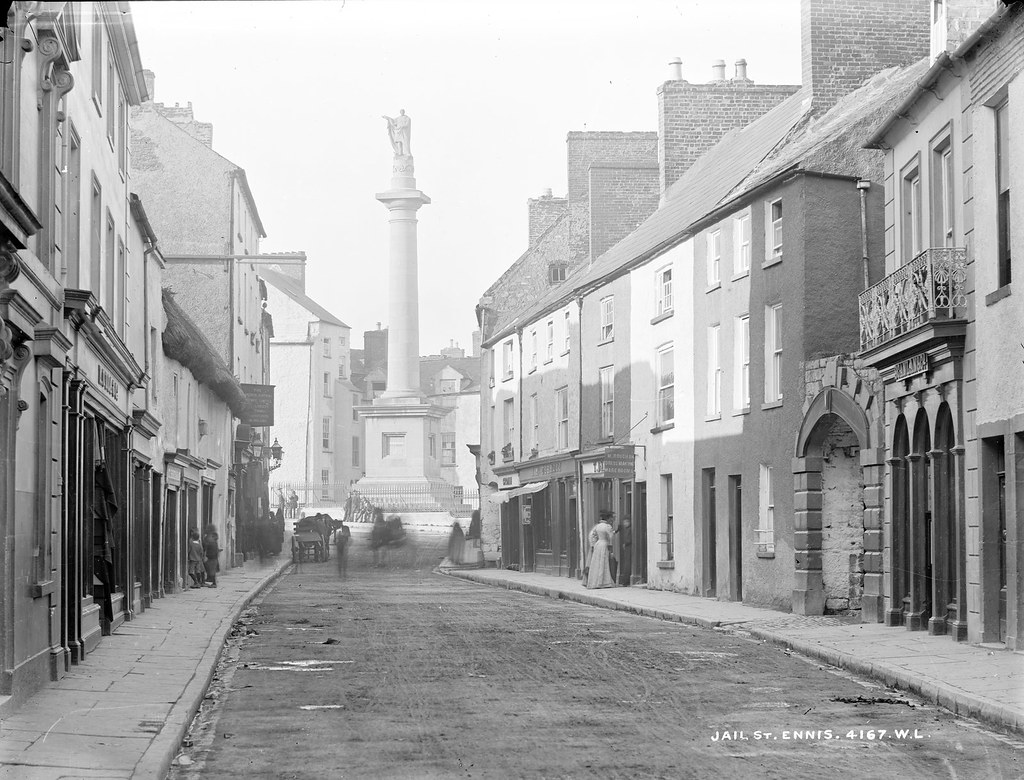
Jail St. Ennis [County Clare]: photographer unknown, c. 1880-1900 (Lawrence Photographic Collection, National Library of Ireland
She
was just a young thin pale soft shy slim slip of a thing then,
sauntering, by silvamoonlake and he was a heavy trudging lurching
lieabroad of a Curraghman, making his hay for whose sun to shine on, as
tough as the oaktrees (peats be with them!) used to rustle that time
down by the dykes of killing Kildare, for forstfellfoss with a plash
across her. She thought she's sankh neathe the ground with nymphant
shame when he gave her the tigris eye! O happy fault! Me wish it was he!
You're wrong there, corribly wrong! Tisn't only tonight you're
anacheronistic! It was ages behind that when nullahs were nowhere, in
county Wickenlow, garden of Erin, before she ever dreamt she'd lave
Kilbride and go foaming under Horsepass bridge, with the great
southerwestern windstorming her traces and the midland's grain-waster
asarch for her track, to wend her ways byandby, robecca or worse, to
spin and to grind, to swab and to thrash, for all her golden lifey in
the barleyfields and pennylotts of Humphrey's fordofhurdlestown and lie
with a landleaper, wellingtonorseher . . .
James Joyce (1882-1941): from Finnegans Wake (1939), Book 1, Chapter 8 (Anna Livia Plurabelle), first published as A Work in Progress, 1925
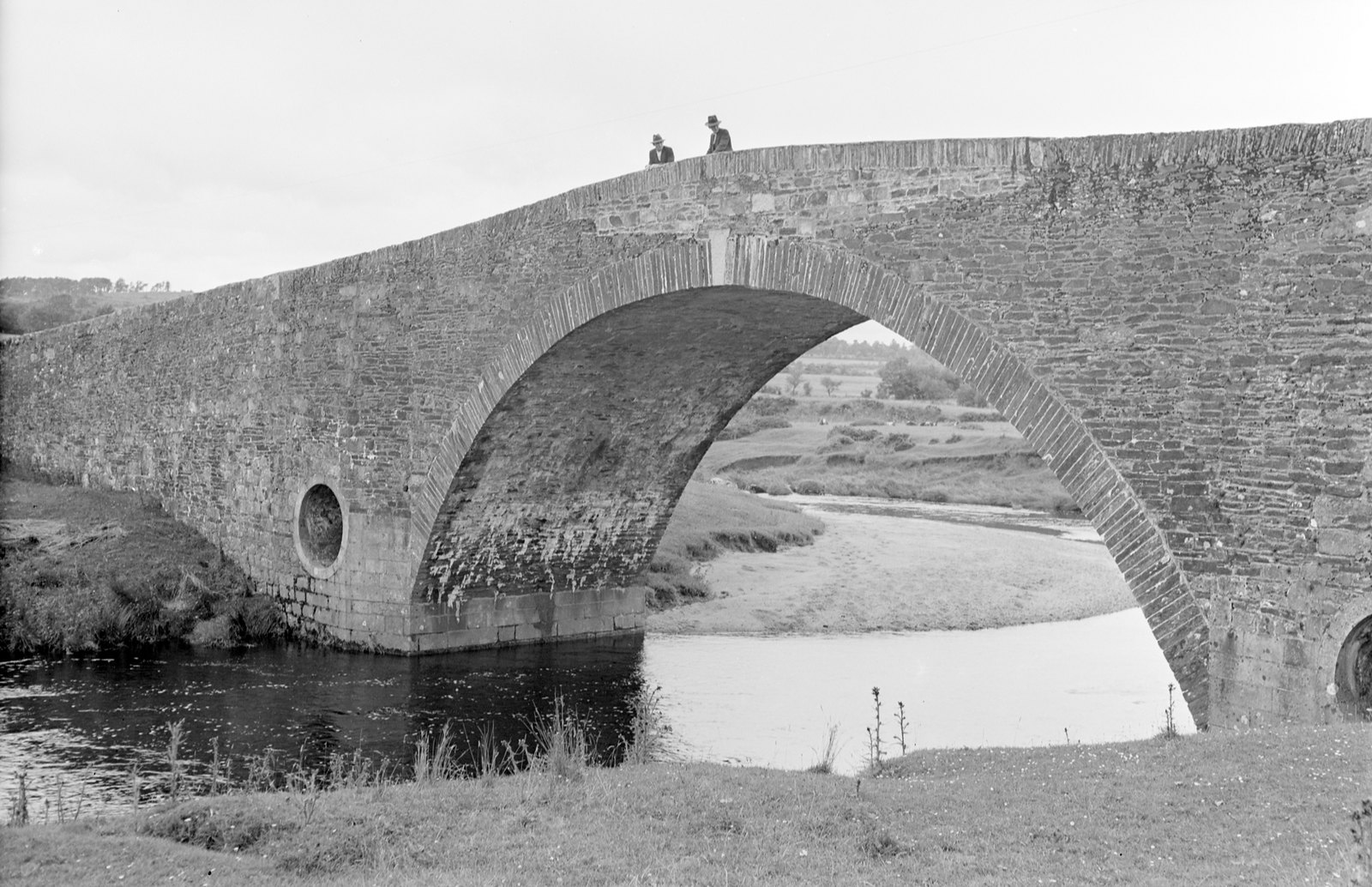
Humphreystown Bridge, Blessington, County Wicklow: photo by James P. O'Dea, c. 1938 (Lawrence Photographic Collection, National Library of Ireland)
It was ages behind that when nullahs were nowhere, in county Wickenlow, garden of Erin, before she ever dreamt she'd lave Kilbride and go foaming under Horsepass bridge, with the great southerwestern windstorming her traces and the midland's grain-waster asarch for her track, to wend her ways byandby, robecca or worse, to spin and to grind, to swab and to thrash, for all her golden lifey in the barleyfields and pennylotts of Humphrey's fordofhurdlestown and lie with a landleaper, wellingtonorseher. . . . .

Humphreystown Bridge, Blessington, County Wicklow: photo by James P. O'Dea, c. 1938 (Lawrence Photographic Collection, National Library of Ireland)
Well,
you know or don't you kennet or haven't I told you every telling has a
taling and that's the he and the she of it. Look, look, the dusk is
growing! My branches lofty are taking root. And my cold cher's gone
ashley. Fieluhr? Filou! What age is at? It saon is late. 'Tis endless
now senne eye or erewone last saw Waterhouse's clogh. They took it
asunder, I hurd thum sigh. When will they reassemble it? O, my back, my
back, my bach! I'd want to go to Aches-les-Pains. Pingpong! There's the
Belle for Sexaloitez! And Concepta de Send-us-pray! Pang! Wring out
the clothes! Wring in the dew! Godavari, vert the showers! And grant
thaya grace! Aman. Will we spread them here now? Ay, we will. Flip !
Spread on your bank and I'll spread mine on mine. Flep! It's what I'm
doing. Spread ! It's churning chill. Der went is rising. I'll lay a few
stones on the hostel sheets. A man and his bride embraced between
them. Else I'd have sprinkled and folded them only. And I'll tie my
butcher's apron here. It's suety yet. The strollers will pass it by.
Six shifts, ten kerchiefs, nine to hold to the fire and this for the
code, the convent napkins, twelve, one baby's shawl. Good mother
Jossiph knows, she said. Whose head? Mutter snores? Deataceas! Wharnow
are alle her childer, say? In kingdome gone or power to come or gloria
be to them farther? Allalivial, allalluvial! Some here, more no more,
more again lost alla stranger. I've heard tell that same brooch of the
Shannons was married into a family in Spain. And all the Dunders de
Dunnes in Markland's Vineland beyond Brendan's herring pool takes
number nine in yangsee's hats. And one of Biddy's beads went bobbing
till she rounded up lost histereve with a marigold and a cobbler's
candle in a side strain of a main drain of a manzinahurries off
Bachelor's Walk. But all that's left to the last of the Meaghers in the
loup of the years prefixed and between is one kneebuckle and two hooks
in the front. Do you tell me that now? I do in troth. Orara por Orbe
and poor Las Animas! Ussa, Ulla, we're umbas all! Mezha, didn't you
hear it a deluge of times, ufer and ufer, respund to spond? You deed,
you deed! I need, I need! It's that irrawaddyng I've stoke in my aars.
It all but husheth the lethest zswound. Oronoko ! What's your trouble?
Is that the great Finnleader himself in his joakimono on his statue
riding the high horse there forehengist? Father of Otters, it is
himself! Yonne there! Isset that? On Fallareen Common? You're thinking
of Astley's Amphitheayter where the bobby restrained you making
sugarstuck pouts to the ghostwhite horse of the Peppers. Throw the
cobwebs from your eyes, woman, and spread your washing proper! It's
well I know your sort of slop. Flap! Ireland sober is Ireland stiff
Lord help you, Maria, full of grease, the load is with me! Your
prayers. I sonht zo! Madammangut! Were you lifting your elbow, tell us,
glazy cheeks, in Conway's Carrigacurra canteen? Was I what,
hobbledyhips? Flop! Your rere gait's creakorheuman bitts your butts
disagrees. Amn't I up since the damp dawn, marthared mary allacook,
with Corrigan's pulse and varicoarse veins, my pramaxle smashed, Alice
Jane in decline and my oneeyed mongrel twice run over, soaking and
bleaching boiler rags, and sweating cold, a widow like me, for to deck
my tennis champion son, the laundryman with the lavandier flannels? You
won your limpopo limp fron the husky hussars when Collars and Cuffs
was heir to the town and your slur gave the stink to Carlow. Holy
Scamander, I sar it again! Near the golden falls. Icis on us! Seints of
light! Zezere! Subdue your noise, you hamble creature! What is it but a
blackburry growth or the dwyergray ass them four old codgers owns. Are
you meanam Tarpey and Lyons and Gregory? I meyne now, thank all, the
four of them, and the roar of them, that draves that stray in the mist
and old Johnny MacDougal along with them. Is that the Poolbeg flasher
beyant, pharphar, or a fireboat coasting nyar the Kishtna or a glow I
behold within a hedge or my Garry come back from the Indes? Wait till
the honeying of the lune, love! Die eve, little eve, die! We see that
wonder in your eye. We'll meet again, we'll part once more. The spot
I'll seek if the hour you'll find. My chart shines high where the blue
milk's upset. Forgivemequick, I'm going! Bubye! And you, pluck your
watch, forgetmenot. Your evenlode. So save to jurna's end! My sights
are swimming thicker on me by the shadows to this place. I sow home
slowly now by own way, moy-valley way. Towy I too, rathmine.
James Joyce (1882-1941): from Finnegans Wake (1939), Book 1, Chapter 8: Anna Livia Plurabelle, first published as A Work in Progress, 1925
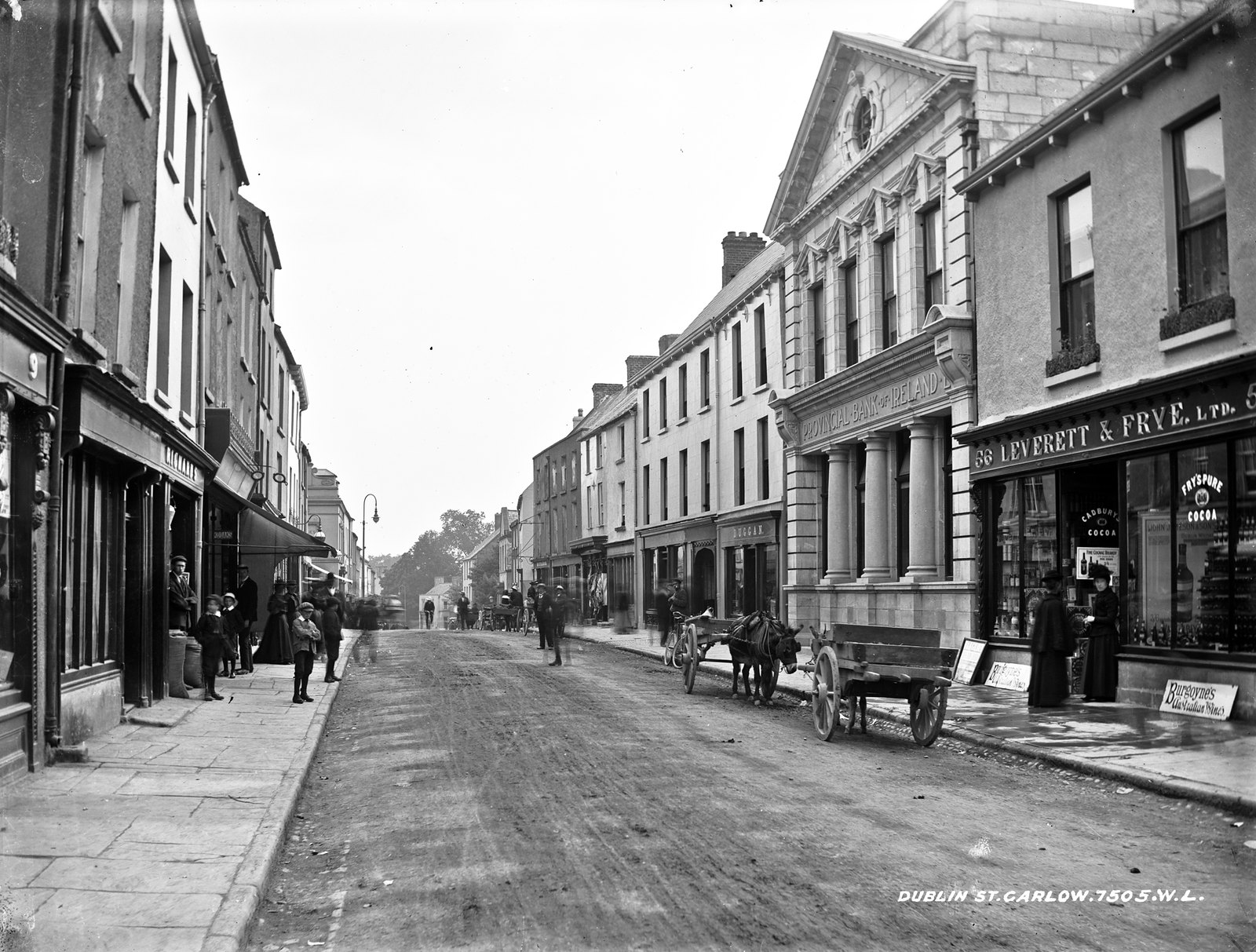
Dublin St. Carlow (County Carlow): photo by Robert French, c. 1900 (Lawrence Photographic Collection, National Library of Ireland)
You won your limpopo limp from the husky hussars when Collars and Cuffs was heir to the town and your slur gave the stink to Carlow. Holy Scamander, I sar it again!

Dublin St. Carlow (County Carlow): photo by Robert French, c. 1900 (Lawrence Photographic Collection, National Library of Ireland)
James Joyce (1882-1941): from Finnegans Wake (1939), Book 1, Chapter 8: Anna Livia Plurabelle, first published as A Work in Progress, 1925

The Quiet Man bridge, Owenriff River, Oughterard, Connemara, County Galway: photo by David Angle, 19 September 2015
Can't hear with the waters of. The chittering waters of. Flittering bats, fieldmice bawk talk. Ho! Are you not gone ahome? What Thom Malone? Can't hear with bawk of bats, all thim liffeying waters of. Ho, talk save us ! My foos won't moos. I feel as old as yonder elm. A tale told of Shaun or Shem? All Livia's daughtersons. Dark hawks hear us. Night! Night! My ho head halls. I feel as heavy as yonder stone. Tell me of John or Shaun? Who were Shem and Shaun the living sons or daughters of? Night now! Tell me, tell me, tell me, elm! Night night! Telmetale of stem or stone. Beside the rivering waters of, hitherandthithering waters of. Night!
James Joyce (1882-1941): from Finnegans Wake (1939), Book 1, Chapter 8: Anna Livia Plurabelle, first published as A Work in Progress, 1925

Owenriff River, above the Quiet Man bridge, Oughterard, Connemara, County Galway: photo by David Angle, 19 September 2015

Owenriff River, below the Quiet Man bridge, Oughterard, Connemara, County Galway: photo by David Angle, 19 September 2015



7 comments:
James Joyce reading 'Anna Livia Plurabelle' (1929 78 rpm recording)
Nice break in the war reporting, Tom.
Thanks for this post, Tom. I had never heard that Joyce recording before---wonderful reading. And those archival photos of Ennis & elsewhere always make me yearn for the old country. Which I will be visiting in October.
I love that reading. You can hear some trace of that great tenor voice of his, I'm sure. Always hope that some recording of him sing "Who'll go with Fergus?" will turn up.
So much of motherhood in those passages from the Wake. The world prior to our beginning does matter.
Wharnow are alle her childer, say?
what a handsome man that James Joyce !
Gracias to all!
"The word is not a thing, but rather the eternally mobile, eternally changing medium of dialogical intercourse. It never coincides with a 'single' consciousness or a 'single' voice. The life of a word is in its transferral from one mouth to another, one context to another, one social context to another. In the process the word does nor forget where it has been and can never free itself from the dominion of the contexts of which it has been a part." -- Bakhtin
"Our language runs every day out of our hands." -- Montaigne
The recording helps us to understand the swift and deep mercurial riverine womanly running of the night history of language through this beautiful piece of writing.
It came about due to the interest of Charles Kay Ogden, a Cambridge linguist and philosopher. Ogden had a deep interest in literature; his first English translation of Wittgenstein's Tractatus came out the same year Ulysses was published. Ogden's brainchild was Basic English. In 1927, he founded the Orthological Institute to promote Basic English. He wanted to train teachers to employ an international language consisting of 850 words in which anything could be said and understood by everybody everywhere. He immediately grasped the usefulness of sound recording in language instruction. He got writers to make recordings for his Institute. There is a recording of Shaw. And there is this recording of Joyce. Joyce was losing his sight. In the dark studio he had a difficult time making out the very large letters on very large sheets of paper which Ogden had prepared for him. Even with Ogden gently whispering prompts, it took him two takes to do the deed. The record sold for two guineas, steep for the epoch. The first impression sold out within a year. Joyce's astounding comic rendition of an Irish washerwoman's brogue wowed people who hadn't been able to make head or tails of his printed text.
About these wonderful photos... The second Ennis shot is a reverse view of the top shot, showing the O'Connell monument. It's not known whether or when or for how long JJ stopped in Ennis, not of course that he couldn't have stopped there without our ever knowing... as indeed we don't... and there is that delicious pleasure in the not knowing, always.
Which leaves the question as to how it came about that Leopold Bloom's father should have become the proprietor of, and met his demise by his own hand, in the Queens Hotel, Ennis.
JJ's notebooks reveal he had made a note, most likely out of the Irish Independent, which had run a brief story on Death in Ennis:
Isaac Marshall, a Yorkshire man, who recently purchased the Queen’s Hotel, Ennis, was found dead yesterday, hanging from a beam in the coachhouse. Mrs Marshall, a Clare lady said at the inquest that she knew of nothing to trouble deceased. Suicide during temporary insanity was the verdict.
Joyce prefigured Odyssean parallels everywhere, Leopold Bloom's father plays the symbolic role of Laertes in this story.
Pearlfishing in the Owenriff at Oughterard is no more.
"Freshwater pearl mussels can be found below the waterfall further down the river. They are now an endangered species. Years ago they were sought after but the industry died out with the development of mussel farming.
"Pearls used in the Crown Jewels, held in the Tower of London, came from mussels harvested in the Owenriff. This mussel needs unpolluted water to survive but is now threatened by the level of algae in the water. The pearl mussel is now protected under the Berne Convention, the Irish 1976 Wild Life Act and the EU Habitats Directive. The mussel is endangered throughout Europe."
The splendid Humphreystown Bridge, Blessington, Co. Wicklow., which it's pretty certain JJ would have at least once or twice crossed over -- at any rate you do feel that, with his lovely reference to it in his riversong -- was blown up between 1938 and 1940 as part of the flooding of this valley to make way for the Poulaphouca Reservoir scheme, which was designed to generate electricity and supply fresh water to Dublin.
"It transpires that the remains of this beautiful bridge lie on the bottom of the reservoir."
Post a Comment